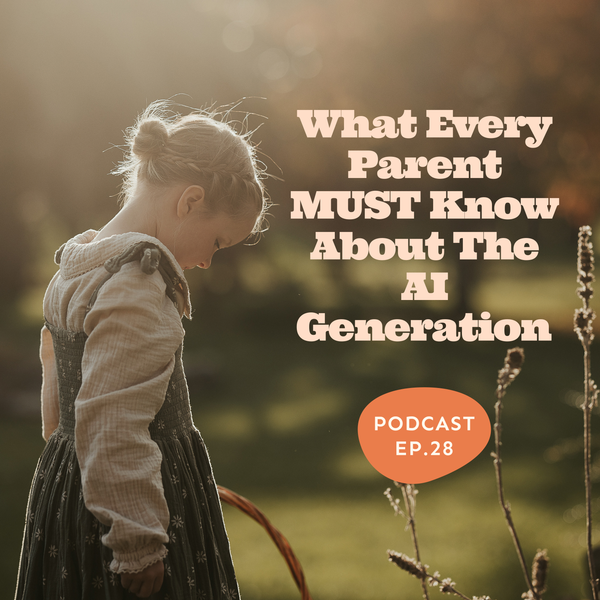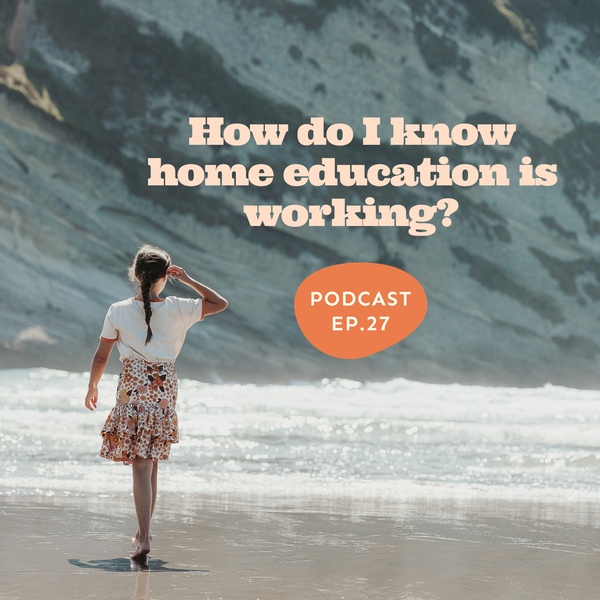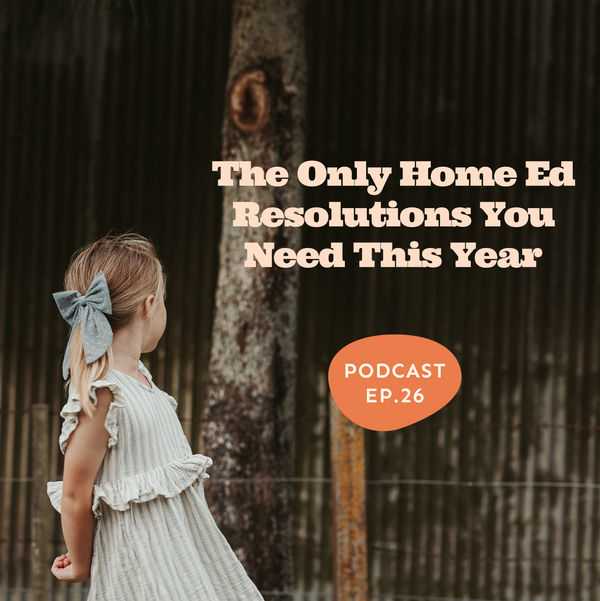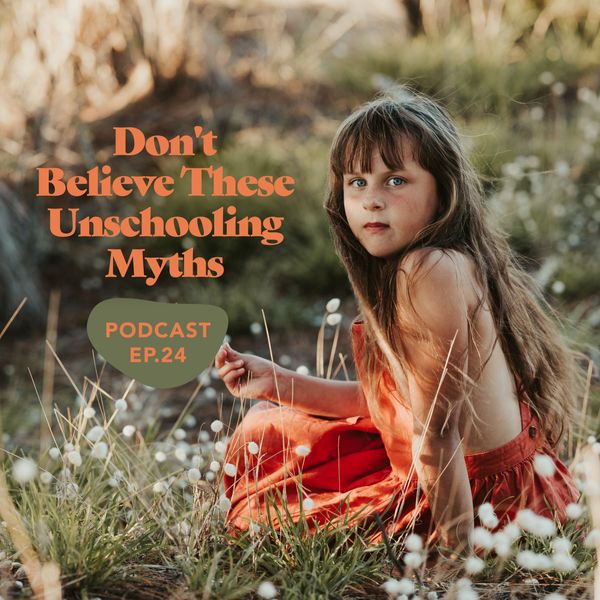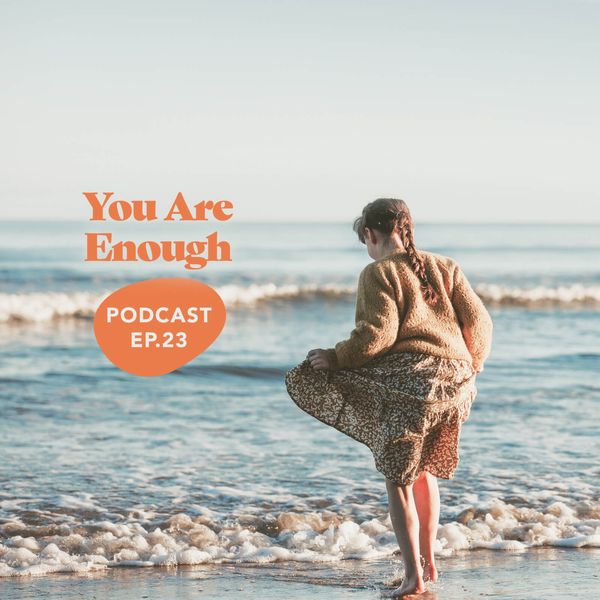With so many families making the decision to leave the formal education system, and take their own path through life, it also means there are a whole lot of grandparents out there going…
Hold on, what’s happening here?! We have a comprehensive, effective school system designed specifically to educate us in all the areas we’ll need to fully prepare for life. Why on earth would anyone walk away from that? And…what’s going to happen to my grandchildren now that they’ve had the opportunity to go through that system taken away?
It…just seems a bit crazy.
Grandparents, I hear you. So today, in this episode, I’m sitting down to have a chat with you.
These private episodes go even deeper, backed by research, the science of how children learn and grow, and more than a decade of lived home educating experience. Each one is designed to help you rethink, reframe, and recalibrate the way you're walking this path, giving you the confidence to live the version of life you want. The Collection is 23 episodes strong and counting, with over 10 hours of listening available right now.
As a subscriber, you'll also get immediate access to my self-paced course, expert-led masterclasses recordings, five downloadable guides, our school exemption documents, and more 💛
Show Notes
Here’s the material referenced in this episode:
- “Inflated”, on US student debt. The cost and debt associated with higher education is absolutely mind-blowing (Scott Galloway)
- Can Homeschoolers Do Well In College? (CBS News)
- Australian home educating alumni study (Home Education Network)
- Homeschooling and the question of socialization (Peabody Journal of Education, via JSTOR)
- Literacy issues in New Zealand (Newshub)
- Weekly mini-episodes 🎙️
Complete Transcript
INTRO
Helloooo and welcome to the Life Without School podcast, here to help you and your children live the life you want to, not just the one you’re told you should.
I’m Issy, a writer and home educating dad from New Zealand.
You can find my work at starkravingdadblog.com – all of my posts, podcast episodes, and short films created to encourage, support and reassure anyone walking this road less travelled.
Thank you so much for tuning in to listen today. Alright, let’s get into this week’s episode.
/INTRO
Hello, thank you for tuning in today, to a conversation that I hope is going to help families, and extended families, connect in a deeper, more meaningful way on their home education lifestyle.
Because with so many families making the decision to leave the formal education system, and take their own path through life, it also means there are a whole lot of grandparents out there going…
Hold on, what’s happening here? We have a comprehensive, effective school system designed specifically to educate us in all the areas we’ll need to be prepared for life. Why on earth would anyone walk away from that? And…what’s going to happen to my grandchildren now that they’ve had the opportunity to go through that system taken away?
It…just seems a bit crazy.
And, grandparents, I hear you. Based on how we’ve been doing things over the past 100 years or so, and a lot of the progress we’ve made in formal education in that time, it really does seem a bit crazy. And I know how much, as a grandparent, you care about your grandchildren’s futures. So, this decision so many parents are making just seems so counterintuitive. It seems risky, and rash.
So today, grandparents, I want to sit down and talk with you. Most of the episodes I make for this podcast are conversations written mostly for your children. They’re designed to bring comfort, reassurance, confidence, and empowerment to the parents of home educated children.
But today, I want to try and bring all of those things to you. The grandparent. Because you play such an important role in your grandchildren’s lives – you are probably incredibly special to them, in so many ways – and this path your children have chosen to walk will be that much richer, and that much more interesting, if you’re on it with them. Especially for your grandchildren.
To set the scene for today, I want to share a few brief words from my father. He’s the grandfather of our four home educated children, of course, but he was also a school teacher. And after that, he has gone on to become a highly respected lecturer and researcher in education. He wrote these words for me to help us set the scene here:
“I recall, as a parent, much of my effort focused on jollying and cajoling my children about the importance of school, even though I knew it was never a very positive experience either socially or academically.
As a teacher at that time, I realized that the business of school had redefined learning as a consequence of administration, curriculum, management and schedules, unfortunately, at the cost of the child’s experience.
I knew I could offer a better educational experience, but when it came down to it, I simply could not forfeit my career, not even for my children.
I know they regret my decision, but in hindsight I realize I would not have offered anything so very different.
I was from a generation that understood that learning occurred as a result of teaching and as such, I would have taught my children, rather than supporting a natural, individualistic style of learning.”
He then goes on to say this, about his role as a grandfather, and the impact it has had on his perspectives, alongside his many years of research:
“As grandparents we present our grandchildren with a different view of the world and a different opinion of what is meaningful.
If asked, I would reply without hesitation, that my grandchildren give unmeasurable meaning to my life: they make me smile, laugh, get playful and take risks.
It is in these moments that I am cognizant of the enduring desire in them and myself, to learn, to progress, and to be an individual. I see the different personalities, the different interest trajectories. And it is in these moments that I understand how meaningful learning must be situated within the child’s aspirations. And explored, right or wrong, through the methods they choose.
I have come to believe that 21st century education must not be about skills or blocks of knowledge, it is about education for emancipation, it is about constructing your place, your identity.
It is about the development of personal aspirations and the passion to accomplish and above all, it is family, not school that gives meaning, encouragement and direction for growth.”
We’re all shaped by our experiences in life. With the conditions, and rules, and expectations of our time. Especially as children. And the things we’re told, and have reinforced to us, during our formative years…they really do stick.
For my father and his generation – he was at school during the 60s and 70s – the importance of formal education was clear. It was a path to a qualification, and a good job, and a way to support yourself and your family. It was a way to open up and take opportunities in life. And for most people who were educated during that era, that perspective has stuck.
What we’re going to do today, together, is consider whether that same importance still applies to the world as it is now.
We’re going to question the place of formal education, and we’re going to question the assumptions we have of it.
So, if you’re ready, let’s talk this through.
MUSIC
Why has my child decided that school isn’t the right path for my grandchildren?
I won’t sit here and tell you that I know exactly why, because…I don’t. There are so, so many reasons why families choose to home educate, and it could be one – or more, usually – of dozens of possible things. But that’s kind of the point here. It’s really important to understand that the reasons and thinking that go into a decision like this are quite varied, because knowing that will make a big difference in how you’ll view your children’s decision.
So while I can’t tell you why your child has chosen this path, I can almost guarantee you that it has involved a great deal of thought, and reflection, and research, and consideration. It will not have been made lightly.
The formal education system is an absolute pillar of modern society. Choosing to leave it is a huge decision. So if you don’t know why your child has decided your grandchildren aren’t a good fit for that system, I encourage you to ask them. And when they give you the answer, I encourage you to really listen. Because what you will likely hear, regardless of the specifics underneath, is a level of passion, and care, and understanding for who your grandchildren are that might surprise you.
Now, it may be a decision that was born from negative experiences, like it is for many, but there’s a good chance it hasn’t come from anything negative at all. It’s wonderful that we have free, or very low cost, schooling available in our modern society. And, it absolutely serves a purpose. But we mustn’t assume that just because it’s so available and accessible it must also be the educational gold standard.
So on top of whatever your child’s why is – which is likely to be quite individual to them – I want to offer you a why that should have every parent and grandparent thinking seriously about all this.
In 2020, UNICEF published a report showing that just over 60% of 15 year olds in NZ have at least a basic proficiency in literacy. Turning that around…over a third of 15 year olds in New Zealand struggle to read and write. Their literacy levels are below basic. A third.
And don’t think this is a result confined to New Zealand – these sorts of numbers are coming out of most developed countries in the world. Real world literacy and numeracy abilities are actually declining. Which, I think, says a lot. Because the more formalised our system gets – the more layers of testing, and benchmarking, and grading, and pressure that we add, the more our foundational skills seem to fall away.
Listen to this: less than 15% of adults worldwide are highly skilled at problem solving in math. The actual number is about 12%.
We focus over a decade of a child’s life on developing their literacy and numeracy, and we’re failing at it. Our formal education system is failing to deliver on developing the right foundation for the majority of our children. The very foundation it makes a promise to us on. And the very foundation most of us worry most about.
Did you know all this? Because I didn’t, and I don’t think most people do. Going back to the fact that the education system is such a pillar of modern society, I think we just all assume – naturally – that it’s providing our children with the standard of education it promises.
But please understand that it is not. It is categorically failing more children than it’s actually helping.
So. Whatever your child’s primary reason for choosing an educational path for your grandchildren that doesn’t include that system, know this. They will not be missing out, now, on some gold standard of education. They will not suddenly be deprived of the opportunity to be taught literacy and numeracy skills to an advanced level, while their schooled peers accelerate forward.
What they will miss out on is a whole stack of pressure, a whole lot of expectations, and a whole lot of testing, that is supposed to ensure they will build the right educational foundation in life but in reality is failing to do so for the majority of children.
So talk with your child about this. Ask them whether they’ve heard those statistics, and how they might be planning to do better for their children. And, ask them how you might be able to help.
And as they discuss their own personal ‘why’ with you – whether it’s from the perspective of a negative experience with the school system, or from believing they can provide a better, more tailored educational path for your grandchildren, remember those literacy and numeracy rates. Remember the assumption most of us carry that the results the system delivers are much, much better than what they actually are.
Because I think really letting that sink in will help you hear so much more validity in your child’s why – regardless of what it is. And, it will start to build a foundation of confidence that…you know what?…your child probably can do it better.
And, that’s kind of exciting.
SHORT MUSIC
Will my grandchildren lack social skills? How will they become resilient, and confident, and prepared for the real world?
The short answer to this is…maybe they will lack social skills, maybe they won’t. But stay with me, because what I’m saying here is really important. Going to school, or not going to school, will not define your child’s ability to relate to other people in life. There are plenty of home educated children who would be perceived as incredibly socially competent, and there are plenty of school children who just wouldn’t be. And then, there’s the reverse of that.
It is not the exposure to a classroom that helps develop social skills. It is a combination of genetics and upbringing. It’s a parent being in tune to the levels of social interaction a child wants and needs, and then that parent making sure the opportunities are there.
Because we need to be clear – there is no one ideal social standard, and no one path to developing it.
I think the perception of home educated children lacking social skills comes from putting too much emphasis on the word ‘home’.
There’s actually research (and I’ll link to this in the show notes if you want to dig into it deeper) that suggests home educated children are more connected to the community around them than school children…simply because they have more time and space to build those connections. It shows that they are more active participants in their local neighbourhoods in various ways, connecting with people of different ages and from different walks of life more often. That they take up more social and extracurricular activities each week, on average.
So if you’re looking for a gold standard of social development, what I’ve just said there is probably it.
But I also think it’s very important to look at this from the other side – which, if we’ve been to school ourselves can be a bit uncomfortable, but walk with me through this.
If we believe that our experiences at school were an example of the best possible social development, have we really reflected back on that journey with the same critical lens we apply to home educators? Have we really thought about our social experiences at school, and both the positive and negative aspects of those? Have we pictured the faces of the other children we went to school with, and thought about what their experiences might have been like now that we have reflective, adult context? Was everyone in that playground, at lunchtime, actually doing ok?
Are we are sure – absolutely sure – that what we went through there is the only way to develop social skills?
And are we sure we’re recognising, and not just ignoring, the many stories of bullying, teenage mental health struggles, and therapy adults go through to help them unpack and process all that?
Because it is a well documented fact that many scars we carry as adults have come from negative social experiences at school. From an environment we had little control over, no opportunity to leave, and – for so, so many – genuine, deep anxiety about.
Ok, but what of resiliency, then – and being prepared for what is often framed as the cold, harsh realties of life?
Well, I believe those cold, harsh realities are self-perpetuating. And I believe many of them can be changed, or ended. I believe we often accept those sorts of aspects of life because we are taught to do so while we’re young. School takes away a great deal of our autonomy – we are told what we’ll be doing, when we’ll be doing it, where we’ll be doing it, and whose purposes we’ll be serving. By the time we’re adults, that’s just normal.
Except, it’s not. It’s not normal to live the majority of our lives without our own deep sense of meaning, and fulfilment. And it’s not ok that in a very short space of time – over the last 150 years or so, through the industrialisation of the world – that we’ve made life that way.
This does not have to be just the way it is. It does not have to be the way your grandchild grows up.
Most of the world being dissatisfied in their work – because they are, statistically – does not have to be the way it is. Chasing money in a loop to pay for things to impress people who don’t even play a big part in our lives does not have to be the way it is. Going to sleep on Sunday night with that heavy feeling in the pit of our stomachs about the lack of control we have over whatever Monday is bringing does not have to be the way it is. Watching things we’re really passionate about, or that really give us meaning, gather dust in a corner somewhere does not have to be the way it is. And spending years preparing our children for a world like that most certainly does not have to be the way it is.
I think it’s time our children, and our grandchildren, grew up unprepared enough for that real world that they can get to work on building us a new one.
SHORT MUSIC
Will my grandchildren fall behind the academic level of their peers?
Of all the worries any of us have, this is perhaps the biggest. Because we’ve been told that the list of subjects we’re taught at school is a reflection of what we’ll most need in life.
But is it?
I mentioned earlier that the levels of proficiency schools are offering our children are a lot lower than what most parents realise, so I won’t talk about that again here. Instead, I want to press on that need aspect. Because if we truly do need the academic proficiency school tells us we do, to live a full, meaningful life, then the idea of falling behind is concerning. And the pressure, justified.
But if we don’t need that proficiency in those areas, then the idea of falling behind – and the pressure that comes with keeping up – isn’t just irrelevant…it’s damaging. It’s harmful.
Picture a really, really long running race. One that takes about a decade longer to finish than a marathon. As you’re lining up, you’re told where the finish line is, how long you have to get there, what your split times need to be, and how and when you’ll be told that you’re either on track or behind. The course is set – you have to take the path that has been decided on, and you can’t veer from it. The race – the length of it, and all the benchmarking along the way, is the same for everyone – regardless of your fitness levels, or even you interest in this kind of thing.
You’re told to start, and then you’re told never to slow down. Because you need to complete the race before you can fully live life. Before you can access the people, and places, and opportunities that will bring you important things like connection, and meaning, and a liveable income.
If you don’t complete the race, in the time and in the way you should, you will not have those same opportunities.
Now, if you got to the end of that race, and you discovered that statement was absolutely true…then gosh, regardless of how difficult you found it you’d be thankful for the experience. You’d be thankful to have been pushed and pushed to get there. You’d be thankful you didn’t question it, and fight it, and try and live your life on a different path.
But if you got to the end of that race – that decade long race – only to discover that the statement wasn’t actually true…that, you didn’t need to complete it to live a full, complete version of your life…how would you feel?
Because that’s the reality for a great many children. They’re just not at all suited to how the race works. They do their best, but every step of the way is a struggle. Then, they finally get there, only to discover that they didn’t even need to go through all those years of being told they’re too slow, too far behind.
But by then, it’s almost too late. Their most important, formative years – having been spent being told they’re just not good enough – are now behind them.
So, like I said, first – we must understand that the standard our schools are bringing our children up to is not what we’d hope it would be, for the shear amount of time invested.
But, second – we must step back and critically examine whether our children, and grandchildren, actually need to run the race at all. Whether…they even need to live within that paradigm, under that pressure, under those expectations.
We must decide whether they need to live under a continual threat of falling behind. Or if, instead, we are brave enough to free them from the concept entirely.
SHORT MUSIC
How will my grandchildren learn technical subjects like math, chemistry and physics without a qualified teacher? Because they might need those things to pursue their chosen career.
I’ve spoken already about the fact we don’t necessarily need every child on the planet learning the very same list of things, to the same level. But let’s assume, for argument’s sake, that your grandchild does. For whatever reason.
So assuming that, let’s talk about the very important distinction between being taught something, and learning something. Because those two things are quite different, and aren’t always connected. And in the environment of traditional schooling, where children are taught things regardless of whether they’re ready or interested, often aren’t connected.
We understand the brain a lot more than we did 100 years ago. Research has shown time and time again that we absorb and retain what we’re interested in, or what will add value or usefulness to our immediate life, and we – more or less – discard everything else.
In formal education, children are capable of taking on what they’re being taught to the point of being able to pass a test. But they very rarely retain that teaching past that critical point. Because, that’s all they needed the teaching for. It’s far too abstract to tell a child they might need the mathematics, or the chemistry, or the physics, or whatever it is they’re being taught, later in life…and have that be enough for them to truly absorb it. Because…we can’t really stand there and tell them, specifically, where, how and why they’re going to need all that information in their individual adult lives. So there’s not enough meaning and real life relevance there.
The percentages of children retaining a high level of knowledge from those topics, to the point where it turns into actual proficiency, is incredibly low. Remember those stats from earlier. And remember that we’re teaching these things to the majority of children on the planet.
What happens if you reflect on your own retention of those topics. Can you put your hand on your heart and say you can genuinely recall a decade worth of knowledge across those technical subjects? Or did you apply most of what you learned in the moment, in whatever way you needed to progress, and most of it has long since faded away? How much is actually left there?
What I’m saying is…it’s not the qualified teacher that makes the biggest difference. It is that a child is actually ready to learn what is being presented, for reasons that are genuinely useful to their life. And this applies to any subject, or any pursuit.
So now, enter home education. Because this is where we have the opportunity to combine qualified teachers – who are available everywhere you turn, now, with the accessibility of incredibly high quality content on the internet – and a readiness to learn from the child. We can find those intersections of interest, and passion, and willingness, and lean into them.
We get to set our own pace, and ultimately – we get to leverage what research has shown to be the best way to learn, depending on who you are. The idea of distributed practice is a great example of this – it means short, sharp, intense bursts of researching or studying or practicing something, followed by breaks that last as long as the person feels they need them to – that could be an hour, or a day, or a week, or a month – and that’s followed by another intense burst…repeated, and repeated, over a long period of time. This is an example of a learning approach that just isn’t possible to apply in a formal classroom setting, but categorically leads to better comprehension, retention, and skill development in whatever it’s being applied to. It’s…simply a better, faster, more efficient way to learn than the kind of style we see in classrooms.
You could genuinely – if you decided it was important, and that you needed to – learn the ins and outs of every mathematical concept schools teach our teenagers from the age of 13 to 18 in…one year. Honestly, a child could, if they wanted to. If, they decided they needed to.
Remember – children in school aren’t learning what they’re learning each year because that’s how long it takes to learn all that, it’s…because that’s how long they need to spend on it, when you mix in all the children, and subjects, and changing of classes, and assemblies, and tests, and…all that stuff.
The point is that by choosing a life without school, you get to learn faster and deeper…because you can slice the blocks of time you spend on it in ways that work best for you and your brain. And when you need them, highly skilled teachers and teaching resources are available everywhere you turn.
So are those technical topics really a worry? Do we really all need them? And if we do, are we really sure that delivering the same material to every child, at the same time, on the same cadence, in the same physical environment, is really the best way to go about it?
There are…better ways. So, have a good look at all this with the freshest eyes you can.
SHORT MUSIC
Ok, but even if they can become proficient in those sorts of technical areas – how on earth will my grandchildren get into university? How will they show that proficiency if they don’t follow the school testing path?
Let’s get this clear really quickly, just so you have some immediate reassurance on it, and then we’ll get into some actual detail: home educated children absolutely can enrol at most colleges and universities. Choosing to home educate does not close college or university doors.
Now, the detail. Yes, it will take more work to prepare their application. That will not be automatically handled for them like it would be if they followed the school path. Yes, they will have to jump through a few hoops, depending on the university or college they’re wanting to attend.
But that’s ok, right? I’m yet to meet a homeschooler that’s afraid of a little hard work for the right outcome. And when they get there, they feel quite at home.
It’s really important to recognise that at a tertiary level learning switches to being quite self-led. It’s a big change from the school years. And often, a home educated child has spent more time building that self-directed learning muscle.
It’s for that reason, I think, that a lot of top colleges and universities aren’t just accepting home educated students – they’re actively recruiting them.
Just look at Harvard – they don’t even evaluate homeschooled applications any differently to the ones coming out of public school. It’s a completely level playing field.
There’s even some research out there showing homeschoolers outperforming their schooled peers in entrance exams, completing their first year of study with higher average marks, and going on to graduate at higher rates.
Another study, that came out of Australia, showed a higher percentage of homeschoolers were going on to tertiary study than the rest of the population.
I’ll link both of those pieces of research in the show notes, if you want to dig deeper, but the high level point is…home educated children absolutely can attend university, and will be quite capable of performing there.
But before I move on, I want to briefly touch on what I believe is a sizeable elephant in the room. As a society, we talk so much about the higher education path. About qualifications, and degrees, and diplomas. But we don’t talk nearly enough about who actually needs them. And we don’t talk nearly enough about the mountains of debt our young people are accruing, and whether that trade-off is actually worth it.
Let’s take some statistics from the United States as an example, here – and I’ll link to an article that quotes these as the source (https://www.profgalloway.com/inflated/).
Over the last four decades, undergraduate tuition costs have risen by almost 7% a year. That’s an inflationary increase, in that period of time, of nearly 1400%.
By the end of last year, student loan debt in the US had overtaken credit card debt. And yes, you heard that right. $1.7 trillion dollars is what American students currently owe.
In 2007, 23% of college students were living with clinically significant symptoms of depression. That was already high. But by early 2020, that had grown to 47%.
We have some of the most successful companies in the world becoming very vocal about their de-prioritisation of formal qualifications in their recruitment process, yet we have relentlessly increasing costs and ballooning volumes of debt to gain those pieces of paper. The ones that have declining real world value, except for a few very specialist careers.
It’s no wonder our graduates our feeling so frustrated, and cornered, and stressed, and…in many cases…hopeless.
We must do better than this. And the very least we can do is make absolutely sure our children, and grandchildren, really do need that higher level qualification. If they do, great. Let’s support them to go and get it. But if they don’t…we have the opportunity to set them free from that pressure, and that expectations, and that debt.
CLOSING MUSIC
I want to close this conversation today with one more question – because, I hope that this is the headspace you’re starting to get to:
How can I best support my children, and my grandchildren, on this journey?
Well, firstly, I can tell you that you’ve already done so much just by being here, and listening in. The home education road is incredibly rewarding, but equally challenging, and honestly – it can be a bit lonely. So I can promise you, that just being here today will mean the world to your child.
I’ve talked through a lot here. So, take some time to consider your own thoughts and feelings in response to all this. Some of them will be raw and very real, built over a lifetime of lived experiences.
Shifting perspectives over night isn’t easy for anyone (about anything!), so give yourself the grace to process what you’ve just heard against what you understand the world to be today. There’ll be a lot to think about.
And you know what? You probably haven’t had all of your questions answered here today. That’s ok. But what I hope you’ll take away is that the home education lifestyle is not what the old myths say it is. It is a considered, reasoned, exciting, and rapidly growing approach to life in a time of human history that is very different to what it was 50 or 60 years ago. A time where more and more parents are realising the education system that served us well in the 20th century will not serve us now.
So what next? Well, the really fun part about all this is that you’ve now got the opportunity to be more involved in your grandchildren’s lives than you ever imagined! Many home educating families reinvest their classroom time into their family and their community, so jump in and offer your support and understanding.
Try to be as open to the experience as you can, because as someone who has lived through many decades of experiences, you have so much perspective and wisdom to offer your grandchildren.
If you’re ready to get involved, there is a wonderful opportunity ahead to experience a whole new kind of life alongside them.
Thank you so much for listening today, it has been an absolute pleasure to sit down and chat through all this with you. And, hopefully, I’ll see you back here for the next episode.
Take care, ok?
Bye for now.



